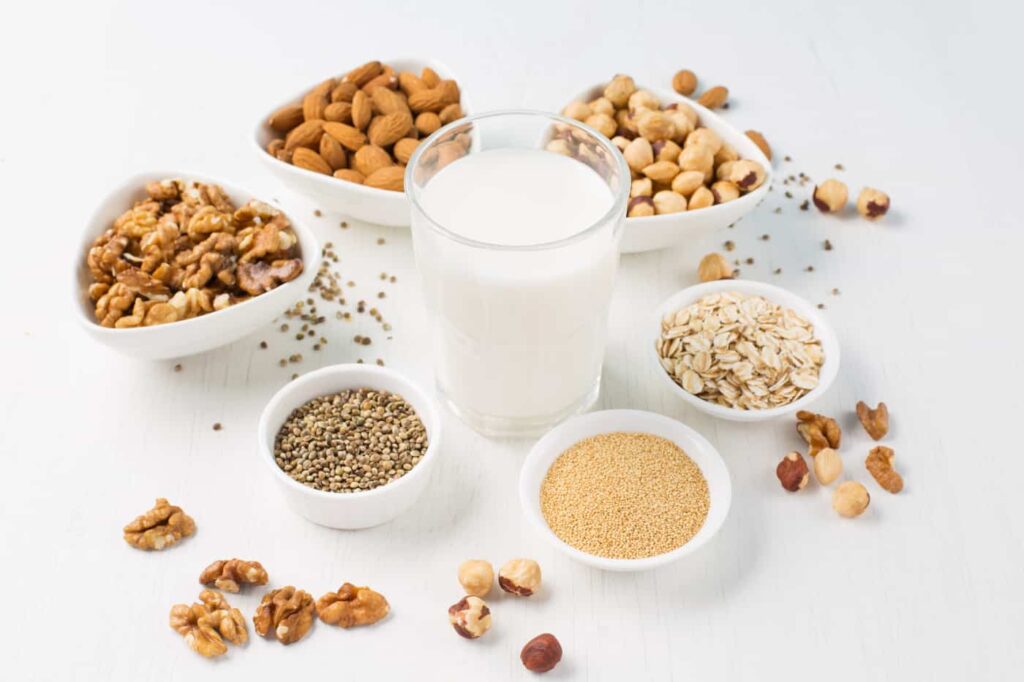The Ultimate Resource for Finding the Best plant-based milk
4 min read
Environmentalism and social responsibility are becoming more and more crucial in today’s rapidly evolving world. Fortified plant milk is an alternative to dairy milk made from plants and is an excellent first step toward a greener way of living.
Even before the popularity of plant-based diets, the best plant based milk substitutes were. Widely used in restaurants and homes around the globe.
Although cow’s milk has traditionally been considered essential to the American diet. Many people now avoid it due to lactose intolerance, dietary restrictions, or ethical concerns.
There are a lot of plant-based dairy milk alternatives to choose from, which can make trying one out a bit daunting. Below are some of the most noticeable distinctions and things to watch on your next purchase;
SoyBean Milk
Typically, soy milk is created by mixing soy protein. Powder with water and is one of the best milk for lactose intolerance. The protein content of milk from soy is higher than that of most other plant-based milk alternatives, making it a healthy and protein-rich option. And since most soy milk has calcium added, it’s essentially the same as cow’s milk.
Individuals consuming a vegan diet may be at risk for vitamin B12 deficiency; many soy milk address this concern by including added vitamin B12.
Cashew milk
Almonds are. Made with almond flour. Almonds can make up anywhere from 2% to 14% of commercial almond milk. Still, a variety of alternatives exist that don’t contain any sugar.
If you’re taking note of your fat and calorie intake, almond milk is a better option. The protein content is low overall, with a typical serving containing only 1 gram.
However, in recent years, protein has been. Added to a number of varieties; some contain as much as 10 g of protein per 250 mL. An alternative is a serving of cow’s milk containing only eight grams of protein.
Almond milk is available for those who have a dairy, soy, or lactose intolerance. It is plant-based dairy milk, and you need not worry about using this item if you have an allergy to dairy or soy or if you are lactose intolerant.
Suppose you want to replace dairy with almond milk. Finding a brand that provides at least as many nutrients is essential. This is true of the market staples, thankfully.
Oat milk
Blend some oats with a bit of water and strain the resulting liquid to make oat milk. Saturated fat content is low.
Unlike most plant-based dairy milk, oat milk contains the dietary fiber beta-glucan, making it a healthy option. It has been shown that beta-glucan can aid in lowering cholesterol and maintaining healthy blood sugar levels.
Milk from oats has a higher carbohydrate content than cow’s milk, making it taste sweeter. Milk from Oat can be used in place of cow’s milk in recipes because it has similar properties. Oat milk is your best bet when looking for plant-based milk with a creamy texture.
Oat milk has about half the protein of dairy milk, with only four grams per serving on average. If you drink oat milk, look for brand fortified plant milk with calcium. Pick one that has extra protein added to it as well. However, oat milk does contain gluten.
Rice milk
Food allergy sufferers can safely consume rice. Milk as it is one of the best plant-based milk because it is made from. Milled brown rice and water. The processing of rice results in the breakdown of carbohydrates into smaller sugars, giving the grain a distinctively sweet flavor. Rice milk is the most hypoallergenic of plant-based milk.
Try to find rice milk that has protein and calcium additives, ideally 100 milligrams per 100 milliliters of each. Insufficient protein makes rice milk inappropriate for infants’ diets.
Protein and energy
must be obtained from other sources in. The form of solid food if a young child’s diet frequently includes dairy alternatives like almond or rice milk. When in doubt, consult a pediatric dietitian specializing in vegan or plant-based diets for children.
You can make macadamia milk by blending soaked macadamia nuts and water together. As a result of its unique composition, macadamia milk contains very little protein and no calcium at all. Macadamia milk is high in healthy unsaturated fats.
Macadamia milk can be used as a dairy substitute in. Cooking and hot beverages due to its creamy consistency. As an alternative to dairy milk, macadamia milk fortified with vitamin D, vitamin B12, and calcium is a wiser choice.
Pea Milk
Pea milk can be made with added vitamins and. Minerals, like vitamin B12, by blending pea protein with sunflower oil. Water, and other ingredients. Protein content in pea milk is comparable to that of fortified plant milk.
Hemp Milk
You can make your own milk from hemp by blending water and hemp seeds from the hemp plant. Hemp milk, importantly, does not include any of the intoxicating compounds that are common in marijuana.
Hemp milk is lower in energy, protein, and carbs than whole milk from a cow. It’s a great way to get your omega-3s, too! Opt for the commercial varieties, typically fortified with essential nutrients like calcium, vitamin B12, and vitamin D for optimal health.
Coconut milk
Milk is made by combining. Coconut cream and water. Coconut. Milk has more saturated fat but fewer carbohydrates. And protein than soy or almond milk. Opt for a fortified variety if you’re trying to make up for the lack of calcium in your diet.
Conclusion
Plant-based milk can be a wise and healthy option from infancy into adulthood. Non-animal milk is gaining in popularity. People may switch to plant-based milk for various reasons, including an allergy to dairy, lactose intolerance, or concerns about the environment and ethics. Compared to cow’s milk, the nutritional profile of soy milk is the most similar to any plant-based milk. Choose plant-based milk with calcium added if you’re concerned about bone health.






